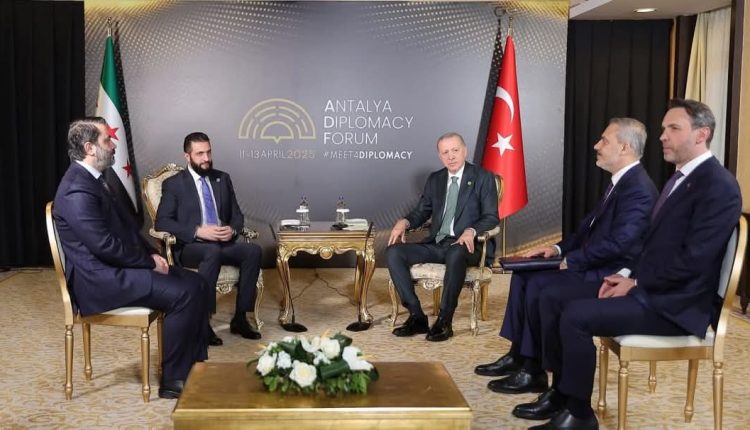Syrian Interim President Meets Erdoğan in Antalya Amid Renewed Regional Engagement
By Kardo Roj
ANTALYA, Turkey (North Press) – Syrian Interim President Ahmad al-Shar’a held a meeting with Turkish President Recep Tayyip Erdoğan on Friday on the sidelines of the Antalya Diplomacy Forum, in a rare high-level encounter reflecting growing regional engagement with Syria’s transitional leadership.
The Syrian Presidency confirmed that the meeting took place in the presence of Foreign Minister As’ad al-Shibani and his Turkish counterpart Hakan Fidan. The brief statement did not disclose the specific topics discussed during the talks.
The meeting marks a symbolic moment in Syria-Turkey relations, which have long been strained due to years of political divergence and military entanglements within Syrian territory. The forum setting provided a diplomatic space for cautious dialogue amid evolving regional dynamics.
President al-Shar’a’s visit to Turkey—his second since assuming office—comes at a time when regional actors are reevaluating their positions on the Syrian file. While Ankara has supported opposition-affiliated entities, including the Syrian National Army (SNA), the presence of the interim Syrian president at a Turkish-hosted diplomatic event signals potential openings for pragmatic engagement.
Although no official agenda was made public, analysts suggest that the discussion may have included topics related to border security, economic coordination, and ongoing regional tensions, particularly with regard to recent Israeli airstrikes in Syria. Erdoğan’s earlier remarks at the forum included accusations against Israel for allegedly inciting sectarianism in Syria, a theme that may have framed broader security conversations.
The backdrop of the Antalya forum offers a wider regional canvas, where dialogue among former adversaries is increasingly being explored amid shifting international priorities and emerging security threats.
The meeting also holds indirect significance for Syria’s northeast, where the Autonomous Administration of North and East Syria (AANES) exercises governance and the Syrian Democratic Forces (SDF) maintain security with international backing. While not party to Friday’s discussions, the AANES and SDF remain central actors in any comprehensive resolution to the conflict.
Observers note that ongoing efforts to stabilize Syria must account for the decentralized reality on the ground, particularly in territories where local governance structures have fostered relative peace and continued counterterrorism operations. Any bilateral agreements or security arrangements between Damascus and Ankara would likely need to consider the AANES’s role and the SDF’s operational presence, especially in border regions.
The Antalya Diplomacy Forum, now in its fourth edition, has emerged as a key venue for regional and international diplomacy. Hosted by Turkey’s Ministry of Foreign Affairs and attended by heads of state, ministers, and diplomatic representatives from across the Middle East and beyond, the forum serves both as a platform for dialogue and as a barometer of shifting alliances.
This year’s theme, “Embracing Diplomacy in a Divided World,” has proven timely amid deepening global and regional polarization. Syria’s participation, represented by Interim President al-Shar’a, reflects an effort to reassert diplomatic agency and gain support for the country’s transitional roadmap.

